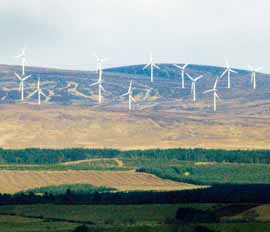Government proposes energy sector shake-up

Plans for the biggest shake-up of energy markets since privatisation have been unveiled by the government.
The Electricity Market Reform White Paper sets out the main measures needed to attract investment, reduce the impact on consumer bills, and develop a mix of electricity sources including gas, nuclear, renewables and carbon capture and storage.
A key element of the reform is the proposal to introduce a carbon price floor from 2013, as announced in the Budget 2011, to provide a stronger incentive to investors. Another proposed measure is for new long-term contracts in the form of “Feed-in Tariffs with Contracts for Difference”. These provide a long-term incentive set at a fixed level, under which variable payments are made to “top-up” payment to the electricity generator to the agreed tariff.
The White Paper also highlights a number of measures designed to improve energy efficiency, such as the Green Deal programme for households due to come in later next year, and improved competition among energy suppliers.
Alongside the White Paper, a Renewables Roadmap has also been published outlining how to increase renewable energy deployment to meet the target of 15% of all energy consumption by 2020, while also reducing the cost of technologies.
It says wind (including offshore), biomass and heat pumps will be the main energy contributors, with the remainder from technologies such as hydropower, solar PV, and deep geothermal heat and power.
The main recommendations for each technology type in the roadmap are:
Onshore wind
• Provide long-term certainty for investors through electricity market reform and a managed transition from the Renewables Obligation
• Reform the planning system to support economic growth and give communities a greater stake in development
• Co-fund technical solutions to overcome wind farm interference with aviation radar
• Upgrade onshore transmission capacity and ensure that developers secure timely and cost-effective access to the network.
Biomass electricity
• Publish a strategy for the growth of sustainable UK biomass energy later this year
• Introduce new Renewables Obligation bands to come into force from April 2013, and link payments to sustainability standards from April 2013
• Focus on measures to support long-term waste fuel supplies, including through possible landfill restrictions on waste wood
• Work with regulators to introduce cost-effective fuel monitoring and sampling systems and ensure environmental legislation does not have an unintended impact on renewable energy plant.
Biomass heat
• Increase the attractiveness of biomass heat and biomethane injection into the grid through introduction of the Renewable Heat Incentive and the Renewable Heat Premium Payment
• Consult this summer on a new scheme to support renewable heat in Northern Ireland, subject to agreement of the Northern Ireland Executive
• Ensure sustainability of biomass heat through the introduction of reporting criteria for feedstock from 2011 and emission performance standards under the second phase of the RHI
• Work with regulators to enable anaerobic digestion plant to benefit from reduced regulatory burdens and faster permitting, including whether it is appropriate to amend regulations that apply to biogas injection to the grid.
Ground source and air source heat pumps
• Introduce the RHI for non-domestic installations and the RHPP for eligible domestic scale heat pumps
• Streamline the planning and consenting processes through the provision of guidance for open-loop ground source heat pumps and permitted development rights for some air source heat pumps on domestic properties
• Collect data on how best to improve heat pump performance and raise the technical abilities of installers by tightening standards of training under the Microgeneration Certification Scheme.
Renewable transport
• Identify and agree a preferred approach to achieve the 2020 transport sub-target, and actions for implementation after 2014
• Consider the European Commission’s proposals on Indirect Land-Use Change impacts of biofuels with a view to ensuring effective standards
• Support the market for plug-in vehicles by making up to £30m available for investment in recharging infrastructure and providing a grant of up to 25% of the purchase price (capped at £5,000) for eligible electric, plug-in hybrid or hydrogen fuel cell cars
What happens next?
The government intends to legislate for the key elements of this package in the second session of this parliament, which starts in May 2012, and for legislation to reach the statute book by spring 2013. It is hoped the first low-carbon projects can be supported under its provisions around 2014.
By the end of this year, the government also intends to publish a Bioenergy Strategy to give a clearer indication of the most cost-effective and sustainable role for bioenergy in heat, transport and electricity.
Find out more on the Department for Energy and Climate Change website at www.decc.gov.uk
